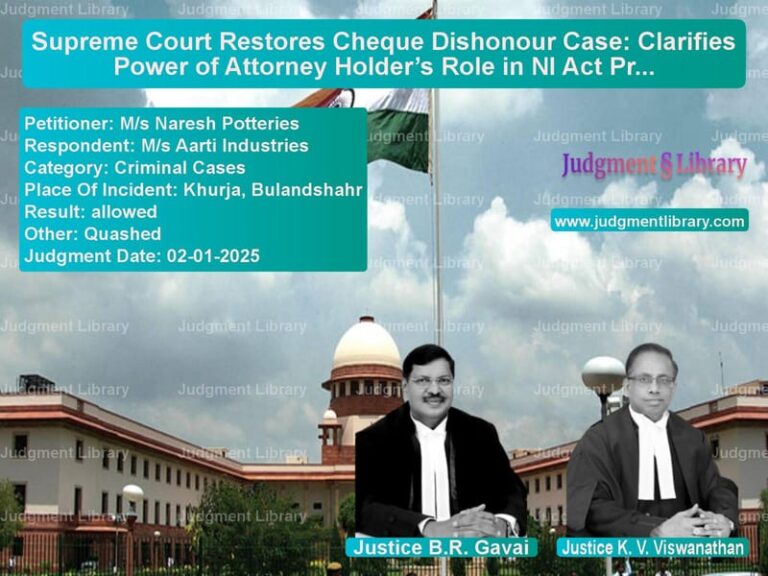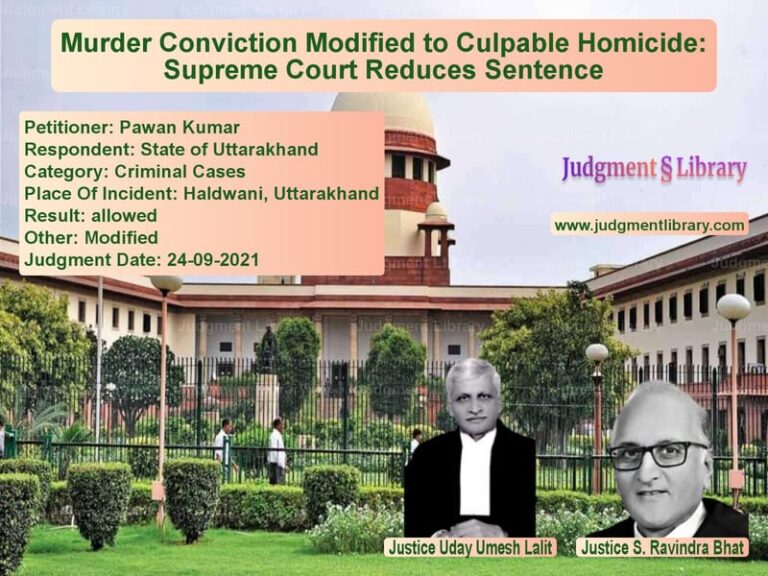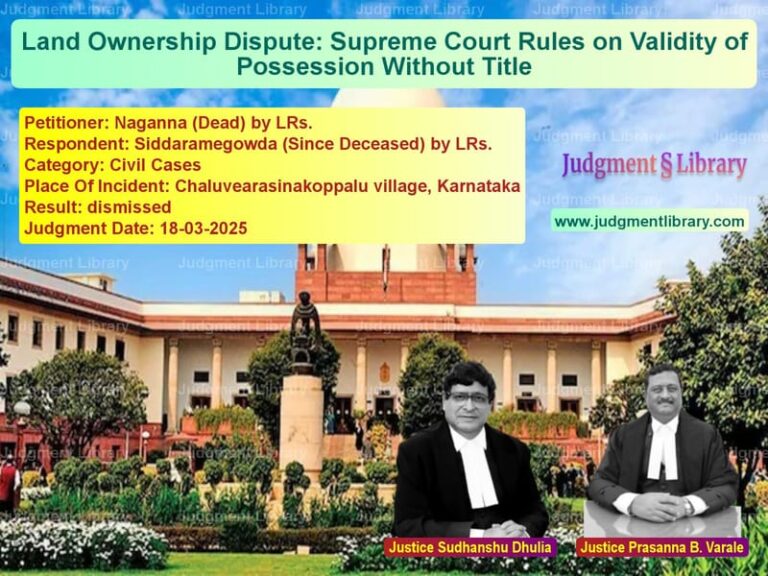Supreme Court Grants Anticipatory Bail to Jarnail Singh in Forgery and Cheating Case
The Supreme Court of India recently delivered a significant ruling in the case of Jarnail Singh v. State of Punjab & Anr., reversing the Punjab & Haryana High Court’s order denying anticipatory bail. The case centered around allegations of forgery, cheating, and conspiracy, leading to an FIR against the appellant, Jarnail Singh. The Court’s judgment highlights key legal principles related to anticipatory bail under Section 438 of the Code of Criminal Procedure, 1973, and the necessity of balancing personal liberty with investigative requirements.
The appellant, Jarnail Singh, sought protection from arrest in connection with FIR No. 271/2019 registered at Police Station City Kapurthala, Punjab. The FIR was lodged on September 18, 2019, under Sections 420, 465, 468, 471, 120-B, and 467 of the Indian Penal Code (IPC). The High Court of Punjab & Haryana rejected his plea, which led him to approach the Supreme Court.
Background of the Case
The allegations against Jarnail Singh stemmed from accusations of fabricating documents with an intent to cheat. The prosecution contended that Singh, along with other accused individuals, engaged in fraudulent activities to mislead authorities. The charges framed against him included:
Read also: https://judgmentlibrary.com/supreme-court-overturns-confiscation-of-vehicle-in-cow-slaughter-case/
- Section 420 IPC (Cheating and dishonestly inducing delivery of property).
- Section 465 IPC (Punishment for forgery).
- Section 468 IPC (Forgery for the purpose of cheating).
- Section 471 IPC (Using as genuine a forged document).
- Section 467 IPC (Forgery of valuable security, will, etc.).
- Section 120-B IPC (Criminal conspiracy).
The prosecution claimed that the evidence against the appellant was strong and that his custodial interrogation was necessary to unearth further details.
Petitioner’s Arguments
Jarnail Singh, through his legal counsel, contended that:
- The appellant was willing to cooperate fully with the investigation and had no intention of evading authorities.
- The investigation was nearly complete, and custodial interrogation was unwarranted.
- The High Court failed to appreciate the facts and summarily dismissed the bail application.
- The FIR was based on false allegations and lacked substantial evidence against him.
- There was no prior criminal record against him, and he had never been involved in any unlawful activities.
Respondent’s Arguments
The State, represented by Ms. Jaspreet Gogia, opposed the bail plea, arguing that:
- The appellant had failed to cooperate with the investigation and had deliberately avoided giving signature and handwriting samples.
- The allegations were of a serious nature, involving forgery and cheating, which required custodial interrogation.
- Forged documents had been used as genuine, which could have serious implications on various administrative and financial institutions.
- There was a likelihood that the appellant would influence witnesses or tamper with evidence if released on bail.
Supreme Court’s Observations
After analyzing the case and the arguments from both sides, the Supreme Court made crucial observations:
“Considering the entirety of the situation, in our view, the appellant is entitled to the relief of anticipatory bail.”
The Court noted that:
- The investigation was substantially complete, and there was no strong justification for custodial interrogation.
- The prosecution’s claim that Singh had not cooperated did not justify the denial of anticipatory bail.
- Liberty should not be curtailed unnecessarily unless there is a clear threat of non-cooperation or tampering with evidence.
- Conditions could be imposed to ensure that Singh cooperates fully with the investigation.
Supreme Court’s Decision
The Supreme Court granted anticipatory bail and issued the following directives:
- If arrested, the appellant shall be released on bail upon furnishing cash security of Rs.50,000 along with two like sureties.
- The appellant must cooperate with the investigation and provide handwriting and signature samples as required.
- The appellant must present himself before the Investigating Officer on March 14, 2022, at 11:00 AM and remain available for questioning throughout the week from 11:00 AM to 5:00 PM.
Legal Implications of the Judgment
The ruling reinforces the principle that anticipatory bail should not be denied arbitrarily. The judgment highlights:
- Presumption of Innocence: The Court reiterated that an accused is presumed innocent until proven guilty.
- Right to Liberty: Custodial interrogation should only be ordered if absolutely necessary.
- Judicial Discretion in Bail Matters: Courts must weigh the necessity of detention against an accused’s rights.
- Case-Specific Bail Conditions: Courts can impose conditions to balance investigation needs with personal liberty.
Comparative Analysis with Previous Bail Rulings
Several previous Supreme Court rulings have emphasized the need to protect individuals from arbitrary arrests:
- Gurbaksh Singh Sibbia v. State of Punjab (1980): Held that anticipatory bail should be granted unless the prosecution demonstrates a valid need for custody.
- Arnesh Kumar v. State of Bihar (2014): Laid down safeguards to prevent unnecessary arrests in non-heinous crimes.
- P. Chidambaram v. Directorate of Enforcement (2019): Clarified that bail should be granted unless strong evidence suggests interference with the investigation.
Conclusion
The Supreme Court’s decision in Jarnail Singh v. State of Punjab & Anr. is a landmark ruling emphasizing the importance of anticipatory bail in ensuring personal liberty. By overturning the Punjab & Haryana High Court’s order, the apex court reaffirmed that denial of bail should not be mechanical and must be based on sound legal principles.
This judgment will serve as a guiding precedent for future cases where courts must strike a balance between investigative needs and an individual’s fundamental right to freedom.
Petitioner Name: Jarnail Singh.Respondent Name: State of Punjab & Anr..Judgment By: Justice Uday Umesh Lalit, Justice S. Ravindra Bhat.Place Of Incident: Punjab.Judgment Date: 07-03-2022.
Don’t miss out on the full details! Download the complete judgment in PDF format below and gain valuable insights instantly!
Download Judgment: jarnail-singh-vs-state-of-punjab-&-an-supreme-court-of-india-judgment-dated-07-03-2022.pdf
Directly Download Judgment: Directly download this Judgment
See all petitions in Bail and Anticipatory Bail
See all petitions in Fraud and Forgery
See all petitions in Criminal Conspiracy
See all petitions in Judgment by Uday Umesh Lalit
See all petitions in Judgment by S Ravindra Bhat
See all petitions in allowed
See all petitions in Quashed
See all petitions in supreme court of India judgments March 2022
See all petitions in 2022 judgments
See all posts in Criminal Cases Category
See all allowed petitions in Criminal Cases Category
See all Dismissed petitions in Criminal Cases Category
See all partially allowed petitions in Criminal Cases Category







